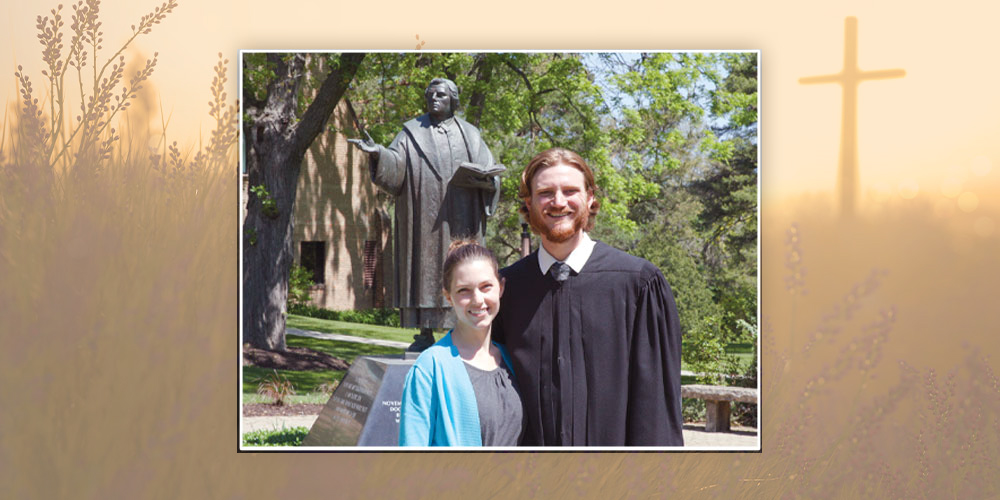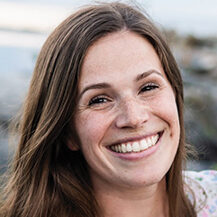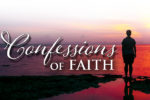 |
A seminary graduate recalls his path to ministry—one filled with questions, challenges, and God’s guidance.
As a young adult studying aerospace engineering in California, Erik Alair never dreamed that he would someday graduate from Wisconsin Lutheran Seminary, Mequon, Wis., fully prepared to be a WELS pastor. Step by step—through many different church bodies and challenges—the Lord slowly revealed the path Erik would take.
A foundation of faith
Erik Alair was baptized in an Evangelical Lutheran Church in America church in Solvang, California. Solvang, a Scandinavian town, was significant to the Alair family because of their Danish heritage. “My great-grandfather, Frantz-Oluf Lund, was actually a Danish minister from Denmark who was sent to Los Angeles as a missionary,” Erik explains. “He planted a Danish church there, and he would preside over services in Danish.”
While the Alair family had a strong Lutheran heritage, they were not necessarily tied to a particular denomination. In fact, Erik was confirmed at a Lutheran Church–Missouri Synod church, and his family even attended the local Presbyterian church at times. “There was not a strong affiliation, but that religious heritage was important,” says Erik. “I praise God for that foundation that was laid.”
A period of wandering
As Erik grew up and began planning for his future, he dissociated from his faith and began to view church simply as “something that you did on Sunday.” He says, “When I got old enough, more mature, more self-sufficient, I thought, I don’t need the crutch anymore.” So Erik stopped attending church.
For a time, he appeared to flourish. He achieved top grades in school and tried to work harder than others. He believed he was a good person. “I wanted to make lots of money and have a good life. That was my thinking,” Erik says. He decided to put his math skills to good use and enrolled in college with the goal of becoming an aerospace engineer.
Before long, however, his own weaknesses, coupled with the sins and brokenness of others, began to challenge his naïve worldview. He says, “It’s a time in my life when I realized that I didn’t have everything together. There was something missing in my life . . . something more worth living for than myself and my own plans.”
An unexpected turning point
For Erik, everything changed when he was invited to a Baptist church in the area. The church’s youth pastor boldly shared his faith in Jesus as his Savior and showed Erik that faith was not only personal to him but also something that impacted the way he lived on a day-to-day basis. He possessed a certain peace in his life, which Erik felt was missing in his own. “He spoke as if the whole world could be taken away from him, and yet he would still have peace and joy knowing that he belonged to Jesus,” says Erik. “That was a turning point in my life. God used this man to reach out to me and help model the way Christians really live their faith.”
Within a few months, Erik read through his Bible from cover to cover and asked the Baptist pastor questions that sparked deep conversations about theology and faith. The world as he knew it had been thoroughly shaken, so Erik decided to drop out of school and embark on a period of soul searching. “The more I read the Word, the more I wanted to share that with others, so the youth pastor eventually encouraged me to think about becoming a pastor myself,” Erik explains.
So, he packed up and moved to Los Angeles, where he attended Biola, a non-denominational evangelical Christian university, with an undergraduate degree in Biblical Theological Studies.
Toward the end of his undergraduate program, he met his wife, Leah, who was just beginning Biola’s nursing program. The two met while participating in Brown Bag Ministry, a program that allowed students to donate their cafeteria meals to those in need. Volunteers would pack sack lunches and transport them to Long Beach, where they would congregate in a church basement to distribute food, build relationships, and share Christ with the community. Erik says, “During the car rides back and forth, we got to talking, and the rest is history.”
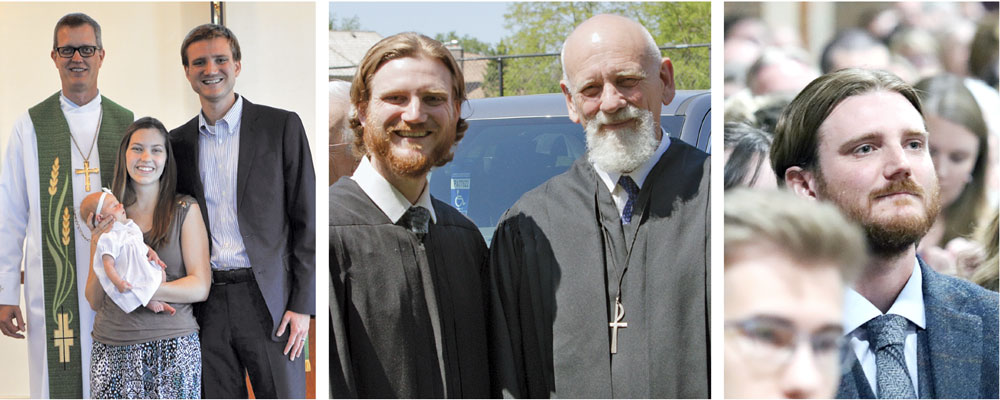
A shared love for Scripture
Leah was raised in a Christian home with a deep knowledge of Scripture. “We sharpen one another,” remarks Erik. “We have that mutual faith.”
As Erik continued his theological education at the graduate level at Biola, he had opportunities to preach and teach, conduct Bible studies, and lead music for worship at churches of varying denominations. But the more he and Leah studied Scripture, the more they felt that the overall focus of these churches was “off.”
Despite their faithful teaching of parts of Scripture, these evangelical churches failed to teach Scripture in its entirety. Erik adds, “In particular, they did not emphasize the central teaching of Scripture . . . the doctrine of justification by faith alone.” Many of these churches also placed undue emphasis on outward displays of dedication to Jesus. For example, Erik and other parishioners regularly participated in altar calls, in which individuals rededicated their lives to Christ publicly.
“You just felt like you had to go up there, because maybe you didn’t live such a good week last week,” says Erik. “You sinned, so you begin to think, Maybe I’m not dedicated. I want to rededicate my heart to Jesus. But you always have that doubt in the back of your mind. Am I dedicated enough? Have I truly surrendered my life to him?”
Scripture shares the opposite message. Erik explains, “Jesus wants to remove all doubt because it’s not about what we do but what he has done.”
Armed with this conviction and a deeper understanding of the means of grace, Erik and Leah began their search for a new church. “We could no longer be part of these church bodies because they don’t teach what Scripture teaches,” says Erik. “And you know what church body does? The only answer is the Lutheran Church.” Erik read the Book of Concord (a collection of confessional writings that state what Lutherans believe on the basis of the Bible) from cover to cover and found himself in full agreement.
As their search for a Lutheran church began, Erik remembered a past conversation with a Biola seminary professor who had served on a Bible translation committee with a couple of WELS pastors. Erik recalls, “He commented on the fact that they knew the languages very, very well. He was very impressed with their scholarship, but he had never heard of them before.”
This is how—just months before their first child was born—Erik and Leah found themselves using the WELS Church Locator to find King of Kings, a WELS church in Garden Grove, California.
Forging a new path
The Alairs felt immediately at home at King of Kings, and when Erik spoke to Timothy Wempner, pastor at King of Kings, about his desire to enter the ministry, Wempner was supportive. Due to Erik’s family situation and previous years of theological studies, Professor Allen Sorum at Wisconsin Lutheran Seminary helped create a path in which Erik could complete his preseminary training remotely.
Once his undergraduate prerequisites were complete, Erik and his young family made the move to Wisconsin so he could attend Wisconsin Lutheran Seminary.
At the seminary, Erik worked hard to balance his classroom work with his growing family. Now, as he crosses the finish line of his senior year, he and Leah are blessed with four young children.
As he looks forward to receiving his first call, Erik reflects on the position in which God has placed him: “I was thinking of Paul’s words to the Ephesian elders in Acts chapter 20. He says, ‘Therefore take heed to yourselves and to all the flock, among which the Holy Spirit has made you overseers, to shepherd the church of God which he purchased with his own blood.’ That’s just amazing that God would entrust someone like me to do that. With all my shortcomings and failures and sins and weaknesses, God will still use me.”
Author: Stephanie Boeckman
Volume 110, Number 7
Issue: July 2023
Non-traditional ministry path
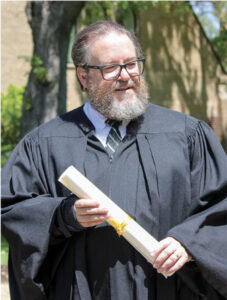
Of the 37 men who earned a Master of Divinity degree from Wisconsin Lutheran Seminary in 2023, four could be considered “non-traditional” or second-career students. Each was assigned to serve as a pastor.
Earle Treptow, president of Wisconsin Lutheran Seminary (WLS), explains, “We have worked hard on having the ‘infrastructure’ in place . . . to assist non-traditional students who desire to serve as pastors.” Efforts include increasing scholarship funds, connecting prospective non-traditional students with those currently in the program, and providing sound counsel to those considering pastoral ministry so they can see and understand the challenges they will face.
While it is certainly an answer to prayer that men are willing to pursue pastoral ministry as a second career, Treptow remarks that these non-traditional students are not the only answer to our synod’s current vacancy situation. “We do not want to give people the impression that they must serve in the public ministry if they want to do something that will really please the Lord. The Lord is glorified by professions other than ministry,” he says.
So what can be done to help remedy the synod’s 12 percent vacancy rate? “All of us need to continue to pray to the Lord of the harvest for more workers for his harvest field,” says Treptow. “We need to speak well of those who are serving as pastors, so that young people see how important pastoral ministry is and how highly God’s people value it.”
- Confessions of faith: Matt and Danielle Cosgrave
- Confessions of faith: Gary Lupe
- Confessions of faith: Nick and Lacey Wagner
- Confessions of faith: Salvador Contreras
- Confessions of faith: Lynne Eby
- Confessions of faith: Colleen Thorson
- Confessions of faith: Boggs family
- Confessions of faith: Four generations
- Confessions of faith: John Jia
- Confessions of faith: Alicia Heintz
- Confessions of faith: Clark Woods
- Confessions of faith: Travis and Frankie
- Confessions of faith: Jason LeMay
- Confessions of faith: Yaz Rodriguez
- Confessions of faith: Jack Cotter
- Confessions of faith: Jack and Cathie Dearing
- Confessions of faith: Caroline and Lawrence McCatty
- Confessions of faith: Shawn Jacobs
- Confessions of faith: Roy Mendoza and Paul Moronczyk
- Confessions of faith: Allen and Rosalind Braun
- Confessions of faith: Anthony and Tyler
- Confessions of faith: Souksamay Phetsanghane
- Confessions of faith: Dale Anne Mondy
- Confessions of faith: Hưu-Trung Lê
- Confessions of faith: Christopher Koch
- Confessions of faith: Teryl and Terry Bishop
- Confessions of faith: Jonathan and Devon Hightower
- Confessions of faith: Julian
- Confessions of faith: Kannika Killion
- Confessions of faith: Jon-Michael Blowe
- Confessions of faith: Kaitlin Lamb
- Confessions of faith: Cheryle and Dana McArdle
- Confessions of faith: Brandee and Jim Cranfield
- Confessions of faith: Brad Harris
- Confessions of faith: Harry and Angie Corey
- Confessions of faith: Hany Guzmán
- Confessions of faith: Kent Gavin
- Confessions of faith: Cristina Urbanek
- Confessions of faith: Anthony and Alex Lleonart
- Confessions of faith: Qiang Wang
- Confessions of faith: Sherry Deaton
- Confessions of faith: Holly Vaden and the Thorsons
- Confessions of faith: Delaney Leffel
- Confessions of faith: Mark Hartman
- Confessions of faith: Daryl Fleck
- Confessions of faith: Kalbach
- Confessions of faith: Richard Bush
- Confessions of faith: Kang family
- Confessions of faith: Gina Beasley
- Confessions of faith: Nick Mount
- Confessions of faith: Jennifer Nelson
- Confessions of faith: Jay Lore
- Confessions of faith: Ramirez
- Confessions of faith: Pat Ensign
- Confessions of faith: Keleen Carlson
- Confessions of faith: Harry family
- Confessions of faith: Israel Asongo
- Confessions of faith: Will Jones
- Confessions of faith: Erik Alair
- Confessions of faith: Anna Linden
- Confessions of faith: Steve Yetter
- Confessions of faith: Ken Blaine
- Confessions of faith: Casy Phillips
- Confessions of faith: Gabby Kim
- Confessions of faith: Quinton Jones
- Confessions of faith: Bernard Dale

